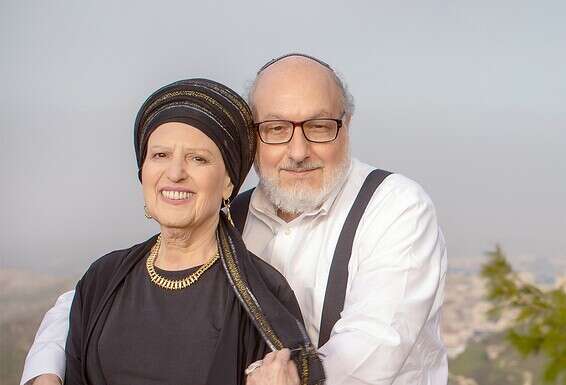 American Jewry consider themselves more American than they do Jews’
American Jewry consider themselves more American than they do Jews’
Boaz Bismuth , Caroline B. Glick and Ariel Kahana
In this excerpt of an exclusive interview with Israel Hayom, Jonathan Pollard discusses why his arrest created such a problem for US Jews and tackles a demon that many would prefer to ignore: Accusations of dual loyalty.
 Jonathan and Esther Pollard in Jerusalem (Eric Sultan) | Photo: Eric Sultan
Jonathan and Esther Pollard in Jerusalem (Eric Sultan) | Photo: Eric Sultan
EXCLUSIVE:
The Jonathan Pollard affair embarrassed Israel, enraged the US, and caused American Jews shame, as well as raising a sense of threat. Pollard’s decision to spy for Israel, especially the ideological justification for the act, hit the deepest and most sensitive nerves of US Jewry and awakened the most frightening demons.
In those years, Jews in influential positions were suspect of using their position to favor Israel’s interests over those of the US, so many Jews saw Pollard as supplying ammunition to those who sought to hurt them. Not only did US Jewry not defend him, but they also avoided him like the plague. Even when the Israeli government started to acknowledge its responsibility, Jewish leaders didn’t lift a finger to help him. The Israeli spy didn’t do much to help himself when he and his wife voiced their opinion about them.
“Their attitude was, ‘Get the hell out of our face. You already showed where your loyalty was.’ And I always have an argument with these people. I said my loyalty is to the Jewish people and the Jewish state. And they said, ‘Well, you don’t belong here.’ I said, ‘Barur [obviously]. I don’t belong here, I said neither do you. You should go home.’ Their answer was, ‘We are home. This isn’t exile, this is the United States.'”
Pollard says that after he was arrested, the FBI gave him a book of names of prominent pro-Jewish individuals, their addresses and phone numbers. “It reminded me of the book the Nazis had for the invasion of England with names of Jews. I was told to put a checkmark next to a name if I suspected they had connections to Israeli intelligence. [They said], ‘You won’t have to give evidence, you won’t have to give testimony in court, nothing, just put a checkmark next to their name.’ I didn’t touch it.”
Q: Do you remember the names?
“Of course. I remember because at the time they were screaming and yelling for my head. They said they had no problem with my life sentence. No one in the Jewish community had a problem with the life sentence.”
Pollard says he once asked a Jewish leader who came to visit him in prison what would have happened if he had brought the evidence of danger to Israel to him, rather than to [handler] Aviem Sella. He said, ‘I would have offered you coffee, and I would have kept you there and would have had the FBI come and arrest you as an agent provocateur.’ What? When people say ‘Never again,’ do they understand what that means? No. No. They don’t understand what that means.”
Q: Jews in the US accuse you of having dual loyalties.
“If you don’t like the accusation of double loyalty, then go the F*** home. It’s as simple as that. If you live in a country where you are constantly under that charge, then you don’t belong there. You go home. You come home. If you outside Israel, then you live in a society in which you are basically considered unreliable. The bottom line on this charge of dual loyalty is, I’m sorry, we’re Jews, and if we’re Jews, we will always have dual loyalty.
“American Jewry has one major problem – they consider themselves more American than they do Jews,” Pollard asserted.
“My father was a very highly decorated army officer during World War II. He graduated from college with a veterinary degree and he was in the US Cavalry, and he got accepted into Yale medical school.
“So he traveled with my mother to Yale, to New Haven, in uniform. He walked into the admissions office and the dean of admissions took one look at him, and said, ‘What’s your real name?’ My father said ‘Pollard.’ ‘No,’ the dean said, ‘What’s your real name?’ So my father said ‘Polanski.’ So the dean said, ‘Jew, huh?’ He said they had one too many and my father would not be admitted. My father said he’d already been accepted. The dean said, ‘One too many.'”
Subscribe to Israel Hayom’s daily newsletter and never miss our top stories!
Q: If a young Jewish naval intelligence officer today is asked by the Mossad to work for Israel, and calls to ask for your advice, what would you tell him?
“I’d tell him, not doing anything is unacceptable. So simply going home is not acceptable. Making aliyah is not acceptable. You have to make a decision whether your concern for Israel and loyalty to Israel and loyalty to your fellow Jews, is more important than your life.
“Because you know what would probably happen to you if you get caught. It will be hell. But you have to look at yourself every morning in the mirror, and you have to live with yourself. If you do nothing, and you turn your back, or simply make aliyah, and go on with your life, you’ll be no better than those Jews who before and after the destruction of the Temple said, ‘It’s not my responsibility.'”
Q: So you recommend that he should do what you did, and pay the price.
“I need him to go in with his eyes open.”
Zawartość publikowanych artykułów i materiałów nie reprezentuje poglądów ani opinii Reunion’68,
ani też webmastera Blogu Reunion’68, chyba ze jest to wyraźnie zaznaczone.
Twoje uwagi, linki, własne artykuły lub wiadomości prześlij na adres:
webmaster@reunion68.com
